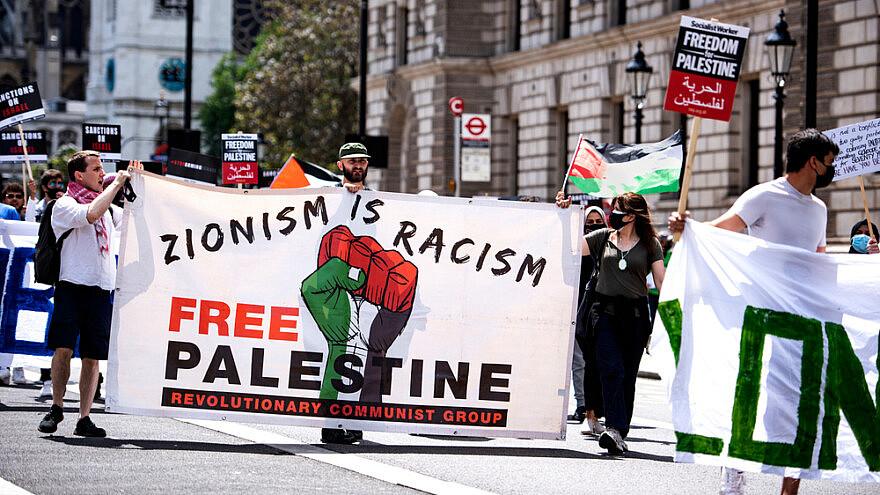The following remarks were delivered by Alyza D. Lewin, president of the Louis D. Brandeis Center for Human Rights Under Law, to the Knesset Committee on Immigration, Absorption and Diaspora Affairs on July 25, 2023. A video of the remarks is available here.
My name is Alyza Lewin. I am an attorney based in Washington, D.C. Much of my professional career has been devoted to pursuing legal initiatives on behalf of the Jewish people.
My father and law partner Nathan Lewin and I brought the first lawsuit in the United States on behalf of Jewish victims of terror seeking damages from groups in the U.S. that were providing material support to Hamas.
My father and I were also responsible for a lawsuit that reached the U.S. Supreme Court twice and paved the way for American citizens born in Jerusalem to list their place of birth on their U.S. passports as “Israel.”
Most recently, I led the team that represented Avi Zinger, the Israeli manufacturer and distributor of Ben & Jerry’s ice cream in his lawsuit against his parent company, which prevented an unlawful boycott of Israel.
I currently serve as president of the Louis D. Brandeis Center for Human Rights Under Law. In that capacity, I speak nearly every day to students who experience antisemitism.
The stories they tell me share some common themes.
First, administrators and the general public do not understand antisemitism.
Many can recognize Jew-hatred when it comes from white supremacists, such as swastikas spray-painted on a wall or overt denial of the Holocaust. But often, administrators are unable or unwilling to recognize other forms. They do not understand that antisemitism shows up differently in every generation.
The one constant about antisemitism, however, is that no matter the century, Jews are alwaysthe scapegoat. Antisemites believe the world would be a better place without the Jews.
Today, we have a Jewish collective—the Jewish nation state of Israel. So, today, it is not only individual Jews that are scapegoated. It is often the Jewish state that is labeled the villain. For example, there are those who accuse Israel of being the world’s worst violator of human rights, while being stunningly indifferent to human-rights abuses in countries such as North Korea, Syria, China and Iran.
Antisemitism has always sought to “other” the Jew, to treat the Jew as unacceptable company, to deny Jews their place in society. Today, antisemitism seeks to do the same to the Jewish collective. It seeks to deny the one and only Jewish homeland its place in the society of nations. Israel is the only country in the world that is told it has no right to exist. That is contemporary antisemitism, but most of the world fails to recognize it as such.
Second, most administrators and the general public do not understand Zionism and Jewish identity.
They do not appreciate that Judaism is an ethno-religion—a belief system inextricably connected to cultural heritage, traditions, history and land. The connection between the Jewish people and the Land of Israel permeates the Jewish calendar, Jewish lifecycle events, Jewish law, Jewish prayer and Jewish history. It is impossible to separate our Jewish ancestry from this land. The Jews are indigenous to Judea.
Today, to be a Zionist means you recognize and celebrate the Jewish people’s connection to one another and our deep-rooted ties to the Land of Israel. It means you believe the Jewish people have a right to self-determination in some borders in our ancestral homeland.
It does not mean that you have no criticisms of Israel’s policies. You can criticize the Israeli government and still be a Zionist.
For most Jews, our Zionism is an integral component of our Jewish identity.
Today, Jewish Zionist students are increasingly vilified, harassed and shunned. University administrators are failing to protect these students because they mistakenly think that what they are witnessing on campus is a political debate.
But make no mistake, ostracizing, marginalizing or excluding Jews on the basis of the Zionist component of their Jewish identity is not “speech.” It is discriminatory and unlawful conduct. It must be recognized and condemned as such.
Third, campus antisemitism is not about Israel’s policies. It is about Israel’s right to exist.
The surge in antisemitism on campuses that we are witnessing today is the result of an organized, well-funded campaign to delegitimize and destroy the Jewish state. It is not about 1967 borders, settlements or even “occupation.” Those responsible for spearheading this harassment have one goal—to end Israel’s existence as the homeland of the Jewish people.
If you don’t believe me, look at this map:
This map was distributed by Students for Justice in Palestine (SJP) at Tufts University as part of a campaign called “Deadly Exchange.” This campaign blames Israel and the Jews for police brutality in America.
Israel does not exist on this map. All of Israel is referred to as “occupied territory.” When people chant “From the river to the sea, Palestine will be free,” this map is what they mean.
On campus today, this map has become the litmus test. To be on the right side of racial and social justice, students are pressured to accept this map and deny Jews the right to self-determination in any borders of the Jews’ ancestral homeland.
So, what can you do?
First, educate yourselves about contemporary antisemitism.
Read the International Holocaust Remembrance Alliance (IHRA) definition of antisemitism—especially the included examples. There, you will learn how contemporary antisemitism manifests itself.
The IHRA definition makes it clear that “criticism of Israel similar to that leveled against any other country cannot be regarded as antisemitic.” At the same time, the IHRA definition includes examples of antisemitism such as the following:
- Denying the Jewish people their right to self-determination, e.g., by claiming that the existence of a State of Israel is a racist endeavor.
- Applying double standards by requiring of it a behavior not expected or demanded of any other democratic nation.
- Holding Jews collectively responsible for actions of the State of Israel.
Reading the IHRA definition will give you a better understanding of how contemporary antisemitism demonizes, delegitimizes and applies a double standard to Israel.
Second, understand that what happens in Israel does not stay in Israel.
What you say and do spreads with lightning speed and has ramifications for Jews around the globe.
Third, remember that self-confidence and pride are the best antidote to harassment and discrimination.
But the key to that self-confidence is knowledge and education. Jews cannot express confidence in an identity they know little about. It is, therefore, essential that Jews in both the Diaspora and in Israel learn more about Jewish history, heritage, culture, literature, prayer and philosophy.
We need curricula that will instill in our children pride in their roots. These programs should include mention of the tremendous contributions to the world that Jews and Israel have made over the centuries.
No one has the right to demand that Jews shed their Zionism or their pride in their ancestral heritage. We must push back against this new form of “erasive antisemitism” that seeks to revise Jewish history and deny the uniqueness of Jewish identity.
When Jews are marginalized and excluded based on a fundamental element in their ancestral heritage, society must condemn it as harassment and discrimination.
Finally, we must appreciate the richness and diversity of Jewish peoplehood.
We must understand that whether you are hiloni, dati or haredi, Ashkenazi, Sephardi or Mizrahi, yemini or smolani—we are all Am Yisrael and Eretz Yisrael is our homeland.
























